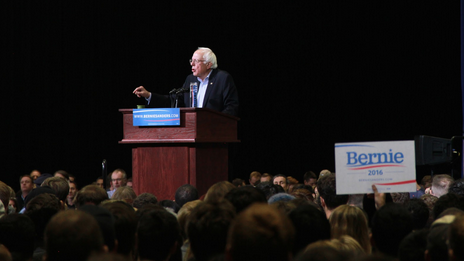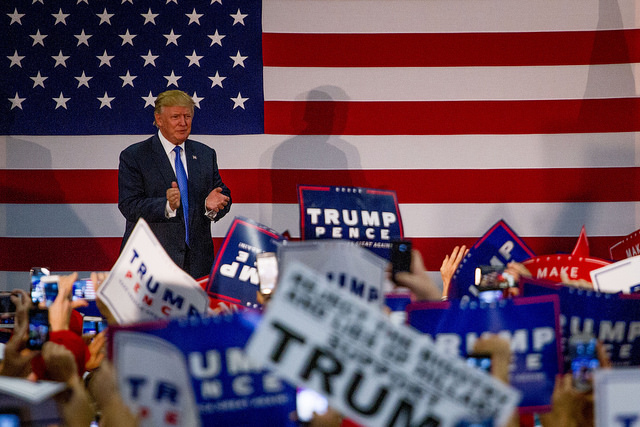At this point in Bernie Sanders’ presidential campaign, it is no longer a secret to anyone paying attention that the Vermont senator is an immensely popular figure in American politics. On October 3, at the Boston Convention and Exhibition Center, Sanders attracted a max-capacity crowd of over 20,000 people.[1] It was his third most popular rally of the year, and the single largest Massachusetts primaries event since 1968.[2] Not a bad turnout, considering that I counted a grand total of one television news van in the building’s reserved parking area.
The speculation about his legitimacy is over. Sanders is surging in Iowa, where he currently holds a 10-point lead over Hillary Clinton.[3] He is garnering 52 percent of the vote in New Hampshire, according to a recent poll conducted by YouGov. Seventy-eight percent of Bernie voters expressed “enthusiastic support” for his campaign, compared to a mere 39 percent for Clinton.[4]
Voters across the country are rallying around Bernie’s campaign platforms, which are both simple and of monumental importance. He advocates primarily for removing big money from politics, establishing a living wage, doing something about outrageous income inequality, protecting women’s healthcare rights, regulating the military industrial complex, and reforming Wall Street. Most impressive of all is that this excitement and campaign success has continued in spite of one of the more disturbingly calculated corporate media manipulations in a very long time.
Though Sanders was recently featured on the cover of Time and interviewed on The Late Show, both in September, the mainstream media’s presidential coverage is still wildly disproportionate in favor of Clinton, Trump, et al. To the casual news consumer who receives his or her information primarily through television and/or major newspapers, Bernie Sanders remains pretty much an invisible man.
Just this Tuesday, Bernie Sanders competed in the national spotlight against his fellow candidates during the first Democratic debate, hosted by CNN. Immediately following the debate’s conclusion, mainstream media outlets all but cried out that Clinton was the event’s resounding victor. Terms such as “debate magic” and “runaway victory” were used by The New York Times and Politico, respectively, to describe her performance.[5][6]
I suppose a valid question is, what defines a “runaway victory” in a presidential debate? After some research, it seems that according to all quantifiable data (aside from total screen time, which went to Clinton by a slight margin) Bernie Sanders put the superior performance. He won the CNN focus group. He won the Fusion focus group. He won the Slate online poll, the CNN/Time online poll, the 9News Colorado, the The Street online poll, and the admittedly liberal Daily Kos online poll. Bernie even won conservative polls, such as the Fox News focus group, the Fox5 online poll, and the Drudge online poll. There was not a focus group in which Bernie did not win by at least an 18-point gap.[7]
Now, maybe I need to refresh my definition of the term “runaway victory.” Perhaps, though, there is something going on beneath the surface here. For fun, let’s say that for a moment we will entertain the latter of those two possibilities.
Bernie has publicly denounced super-PACs, the organizations that pour immense amounts of corporate money into political campaigns in exchange for legislative favoritism down the road. This is not to say that Sanders does not receive funding, however. In the third quarter of this year alone, his campaign has raised around $25 million. The most impressive stat regarding his fundraising: the average average donation is just under $25 per person.[8] The difference between Sanders and Clinton is that his campaign receives its money entirely from private funding, whereas hers do not.
When considering this, it becomes almost compellingly obvious why major television news networks have been quiet and/or misleading about Sanders. It is a very simple case of not biting the hand that feeds. Let’s take CNN for example, since it is the network that televised the debate. CNN is owned by Time Warner, who has donated over $500,000 to Clinton over the course of her political career. You can imagine that Time Warner (and by extension, CNN) is less-than-jazzed about a legitimate presidential candidate publicly announcing where exactly they can shove all their lobbying dollars.[9]
This is not just speculation regarding where CNN’s interests lie. Following the debate, the network posted an online survey to its politics section titled “Who Won The Debate?” Bernie garnered 81 percent of the public vote. Since that did not fit in with CNN’s anti-Sanders narrative, they replace it with an article titled: “Clinton Triumphs in Democrat Debate as Rivals Compete to Lose.” Both have since been removed from CNN’s website after a firestorm of backlash on social media.[10]

Perhaps more surprising than the silencing efforts of CNN and other TV networks and newspapers are those of National Public Radio, the non-profit media syndicate organization. In early September, Mara Liasson, a national political correspondent, closed her segment on Joe Biden’s potential candidacy without even mentioning Bernie Sanders as a possible opponent. Below is a direct quote from her segment.
“There are many Democrats who think [a Joe Biden candidacy] would be good for Hillary Clinton because she’d have a serious opponent. Right now, she’s basically running against herself and her problems.”[11]
It did not take all that much journalistic digging to discover that National Public Radio, which embraces an image of fairness and accuracy in comparison to the more titanic broadcast companies mentioned above, receives over a million dollars in funding from General Motors, Progressive, State Farm, Prudential Financial, and Northwestern Mutual, each.[12]
This is where the blackout becomes dangerous. Major television networks have a certain public persona of bias that viewers carry with them in the back of their minds. However, this is not so with NPR. A 2005 Harris poll affirms a general public trust in the organization. In terms of Sanders’ competitive legitimacy, the disrespect from NPR bites with much sharper teeth.[13]
An official apology was released Sept 5, stating that “a mention of the challenge posed by the Sanders campaign would have been appropriate.”[14] Would have been appropriate. End quote.
Et tu, NPR?
The mainstream media’s attempts to misrepresent Bernie Sanders were extraordinarily clear during the post-debate coverage, but this is only the latest event in an ongoing effort. These attempts are probably most obvious in the New York Times’ presidential coverage, which purports a pro-Clinton-and-her-sponsors-no-matter-what agenda. You can check this out for yourself. There is not a single mention of Sanders under the “Politics” sub-header at nytimes.com. However, some articles do appear after a quick search. A majority of these articles use heavily calculated language that attempts to dismiss Sanders as a nobody, a radical outsider, a fringe candidate with the political odds of a snowball in someplace warm.
“Mr. Sanders’s grumpy demeanor, his outsider status and his suspicion of all things ‘feel good,’ are part of the attraction,” per Times writer Jason Horowitz on August 20.[15] “He has always had a sweepingly macro, if not entirely Marxist, critique of America.” In ‘Bernie Sanders Has Small Lead in Iowa in Latest Poll,’ the Times discredits his 10-point lead over Clinton by calling it “narrow” and by citing her distraction by the email scandal as the primary reason for Sanders’ success.[16] The language in ‘Hillary Clinton’s Support Erodes in National Poll’ is even more confusing to the casual reader: “Mr. Biden and Mr. Sanders are not stirring excitement among the Democratic faithful either…30 percent said they would be dissatisfied should Mr. Sanders become the Democratic standard bearer.”[17]
The active campaign by American corporate media to ignore, discredit, and misrepresent Bernie Sanders certainly began as a tough hill for him to overcome. In an odd way, though, as excitement and support for his campaign grow, the blackout is causing supporters to rally around him even more. What was once a dilemma, or at least something to subvert, has taken on a wholly different feel. The very fact that the media takes Sanders seriously enough to try and snub him out has become a sort of badge of honor. The antiquated agenda-setting strategies that were so effective during major media’s heyday are beginning to lose their grip, it seems.
Social media is taking off with passionate support, particularly on Facebook and Twitter, with people demanding an end to the #BernieBlackout. User-generated media services are not a blip on the tech-timeline, either. They are legitimate, they are here to stay, and Bernie Sanders is riding the wave.
A part of what is so inspiring to voters about Sanders is that his campaign is built on honesty, word of mouth, and a clear-cut message. It is also revealing a paradigm shift in terms of American campaign strategy. The official Bernie Sanders Facebook page recently cracked 1.6 million likes, which is the most of any Democratic candidate, and this all despite the blackout. If there has ever been an indicator of social media’s political significance in the twilight years of mainstream media, or of the broadcast news’ antiquated attempts to set the national agenda, it is Bernie Sanders’ presidential campaign.
The skeptics are vocal, of course. Lest we forget that Sanders is, after all, yet another shrewd politician, armed with ulterior motives, at least per the frequent warnings of jaded roommates and meme-at-the-ready Facebook pals and intensely Republican great uncles – a surefire Thanksgiving staple, these – or whoever else.
Though disillusionment in American politics is understandable, it is important to note that Sanders is not thriving due to any sort of oratorical doublespeak or hidden agenda. The reason that his campaign is on fire, the reason that he attracts crowds into the tens of thousands all across the country, is because he is practicing what he preaches – all without promoting hate speech and xenophobia like a certain unnamed GOP hopeful to our collective and immediate Right.
The fact of the matter is that Bernie Sanders has seemed to overcome the media’s blatant agenda setting, laughing in the face of the conspiratorial marriage between political campaigns and corporate media sponsorship, and all the while his support continues to surge. This speaks volumes to the pressure and frustration that working-class voters are experiencing. America has reached a point in its history where corporate profits for its 15 richest citizens have never been higher, yet the nation’s education and infrastructure are rapidly falling by the wayside.[18] CEOs are earning over 300 times the average employee’s salary. Meanwhile, politicians and propagandists alike are demonizing people who are struggling because they are demanding a fare wage.
Bernie Sanders is calling out the billionaire takeover of our democracy, and his campaign is empowering voters across many ages and backgrounds to get active and become involved. There is no arrogant hate speech. There is no hypocrisy. There is no self-aggrandizing or chauvinism. He is simply sending the long awaited message that if you are feeling frustrated, and tired, and taken advantage of, you are not the only one. Bernie Sanders is here to tell the people – those who find themselves wondering how the Greatest Country on Earth arrived here, at this place – that things can be better, and that they are not alone.
References:
[1] Pindell, James. ‘Sanders Draws Big Crowds In Mass. Campaign Swing’. Boston Globe 2015: n. pag. Print.
[2] Ibid.
[3] Cbsnews.com,. ‘Battleground Tracker: Sanders Surges In Iowa, NH; Clinton Up In SC – Election 2016’. N.p., 2015. Web. 12 Oct. 2015.
[4] Ibid.
[5] Nytimes.com,. ‘Hillary Clinton’S Democratic Debate Magic’. N.p., 2015. Web. 16 Oct. 2015.
[6] POLITICO,. ‘Insiders: A Runaway Victory For Clinton’. N.p., 2015. Web. 16 Oct. 2015.
[7] The Huffington Post,. ‘Bernie Sanders To Grace Cover Of Time Magazine’. N.p., 2015. Web. 12 Oct. 2015.
[8] YouTube,. ‘Why Won’t Bernie Sanders Take “Socialist” As An Insult?’. N.p., 2015. Web. 12 Oct. 2015.
[9] Quinn, Rob. ‘Bernie Sanders Is Raising Money Faster Than Obama Did In 2008’. Newser. N.p., 2015. Web. 16 Oct. 2015.
[10] Maloney, Brian. ‘Fuming Bernie Supporters: Why Is CNN Deleting Our Comments? | Hundreds On Facebook Complain About Network’S Pro-Hillary Coverage | Media Equalizer’. Mediaequalizer.com. N.p., 2015. Web. 16 Oct. 2015.
[11] Keating, Gina, Robert MacMillan, and Lisa Von Ahn. ‘TIMELINE: NBC, Universal Through The 20th Century And Beyond’. Reuters. N.p., 2015. Web. 12 Oct. 2015.
[12] 12bytes.org,. ‘NPR: National Public Radio Or National Propaganda Radio? | 12Bytes.Org’. N.p., 2015. Web. 12 Oct. 2015.
[13] Ibid.
[14] Ibid.
[15] Ibid.
[16] Horowitz, Jason. ‘Bernie Sanders Draws Big Crowds To His ‘Political Revolution’’. Nytimes.com. N.p., 2015. Web. 12 Oct. 2015.
[17] Gabriel, Trip. ‘Bernie Sanders Has Small Lead In Iowa In Latest Poll’. First Draft. N.p., 2015. Web. 12 Oct. 2015.
[18] Hodgson, Paul. ‘Top Ceos Make More Than 300 Times The Average Worker’. Fortune. N.p., 2015. Web. 12 Oct. 2015.



